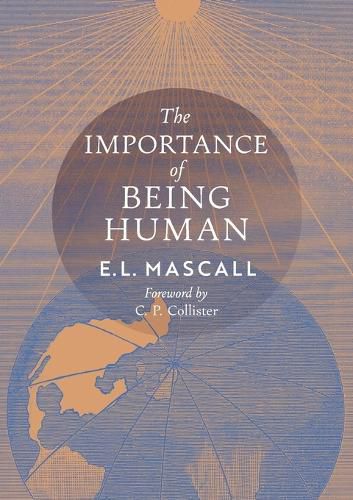Readings Newsletter
Become a Readings Member to make your shopping experience even easier.
Sign in or sign up for free!
You’re not far away from qualifying for FREE standard shipping within Australia
You’ve qualified for FREE standard shipping within Australia
The cart is loading…






This title is printed to order. This book may have been self-published. If so, we cannot guarantee the quality of the content. In the main most books will have gone through the editing process however some may not. We therefore suggest that you be aware of this before ordering this book. If in doubt check either the author or publisher’s details as we are unable to accept any returns unless they are faulty. Please contact us if you have any questions.
In The Importance of Being Human: Some Reflections on the Christian Doctrine of Man, Eric Mascall explains how the Christian account of creation, the fall, the incarnation, and the redemption of human persons in Christ provides the fullest and most truthful explanation of man's present condition and eternal purpose.
Addressing the key distinction between human persons and other animals, Mascall insists that humans are not only highly evolved biological organisms. They are highly evolved biological organisms in a mysterious and complicated union with a spiritual and immortal soul. Christians maintain that this is true of each human person from the first primal pair to the present. Mascall contends that God's act of breathing life into the soil to create man represents a deliberate act of God. Therefore, whatever role chance plays in the development of the human body, human persons, as bodies and spiritual souls, are formed by God's personal act of love...
Mascall insists on the personal aspect of creation with an awareness that his contemporary Anglophone culture seemed apt to reject the existence of the personal in God, angels, and humans. The Church in the ancient world, by contrast, confronted a polytheistic culture that saw persons in everything, including inanimate objects and animals. Modern western culture, Mascall posits, depersonalizes everything, including the ground of being and beings made in the image of God. In ancient polytheistic culture, Christians condemned the irrational and wrongful worship of nature and myriad false gods. Now, Christians face the challenge of explaining why we should worship the triune God and honor persons made in his image. Mascall's prescience continues as he considers what humans should do if and when they attain the power to alter their genetic material. Even if naturalists conclude that they can design a better species than our current genetic makeup allows, Mascall argues that God's incarnation in Christ demonstrates God's relationship to humanity, as it exists. And if God became man that man might be united to him and saved, we should not make ourselves into a genetically distinct creature from the God Man, Jesus. (From the Foreword)
$9.00 standard shipping within Australia
FREE standard shipping within Australia for orders over $100.00
Express & International shipping calculated at checkout
Stock availability can be subject to change without notice. We recommend calling the shop or contacting our online team to check availability of low stock items. Please see our Shopping Online page for more details.
This title is printed to order. This book may have been self-published. If so, we cannot guarantee the quality of the content. In the main most books will have gone through the editing process however some may not. We therefore suggest that you be aware of this before ordering this book. If in doubt check either the author or publisher’s details as we are unable to accept any returns unless they are faulty. Please contact us if you have any questions.
In The Importance of Being Human: Some Reflections on the Christian Doctrine of Man, Eric Mascall explains how the Christian account of creation, the fall, the incarnation, and the redemption of human persons in Christ provides the fullest and most truthful explanation of man's present condition and eternal purpose.
Addressing the key distinction between human persons and other animals, Mascall insists that humans are not only highly evolved biological organisms. They are highly evolved biological organisms in a mysterious and complicated union with a spiritual and immortal soul. Christians maintain that this is true of each human person from the first primal pair to the present. Mascall contends that God's act of breathing life into the soil to create man represents a deliberate act of God. Therefore, whatever role chance plays in the development of the human body, human persons, as bodies and spiritual souls, are formed by God's personal act of love...
Mascall insists on the personal aspect of creation with an awareness that his contemporary Anglophone culture seemed apt to reject the existence of the personal in God, angels, and humans. The Church in the ancient world, by contrast, confronted a polytheistic culture that saw persons in everything, including inanimate objects and animals. Modern western culture, Mascall posits, depersonalizes everything, including the ground of being and beings made in the image of God. In ancient polytheistic culture, Christians condemned the irrational and wrongful worship of nature and myriad false gods. Now, Christians face the challenge of explaining why we should worship the triune God and honor persons made in his image. Mascall's prescience continues as he considers what humans should do if and when they attain the power to alter their genetic material. Even if naturalists conclude that they can design a better species than our current genetic makeup allows, Mascall argues that God's incarnation in Christ demonstrates God's relationship to humanity, as it exists. And if God became man that man might be united to him and saved, we should not make ourselves into a genetically distinct creature from the God Man, Jesus. (From the Foreword)